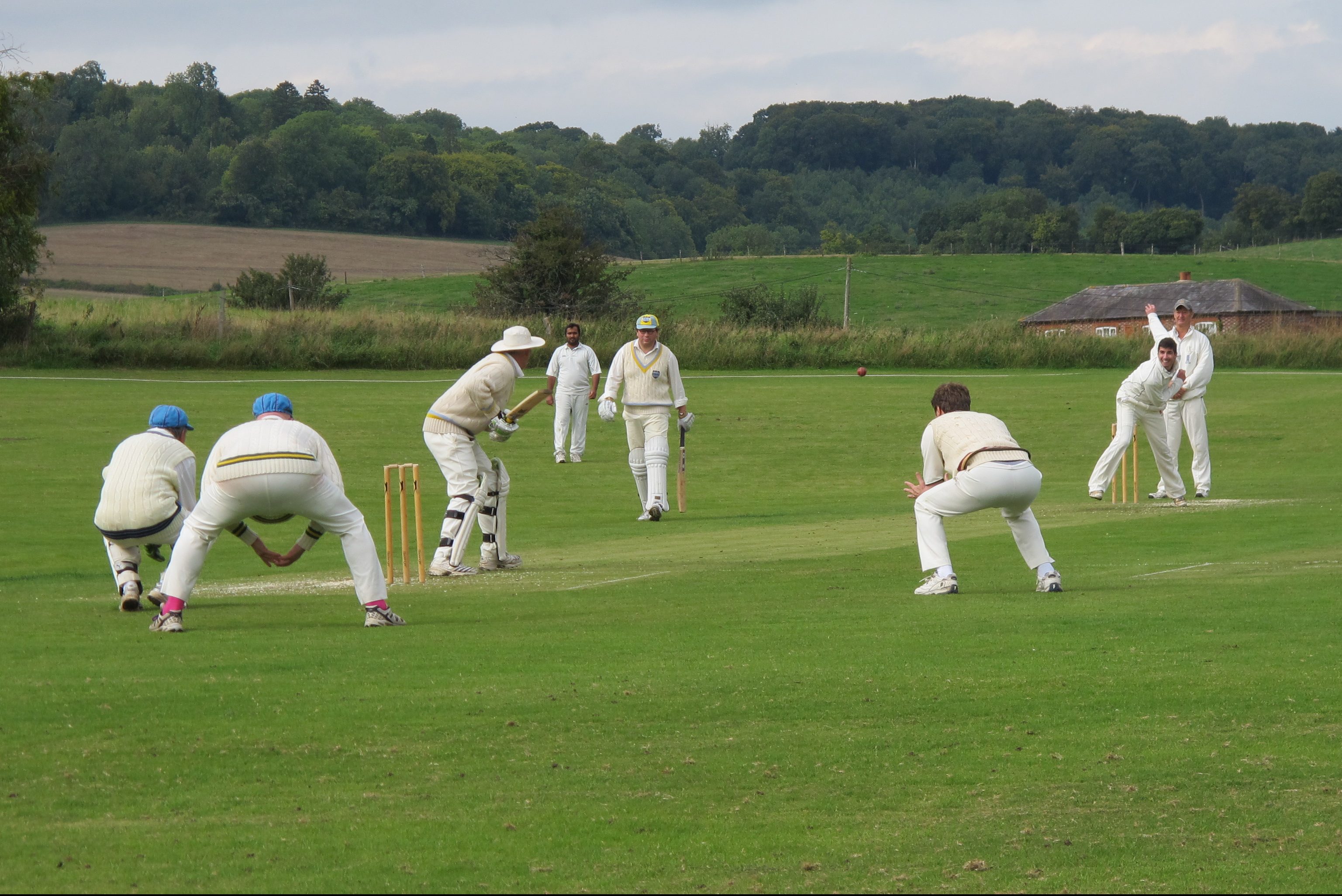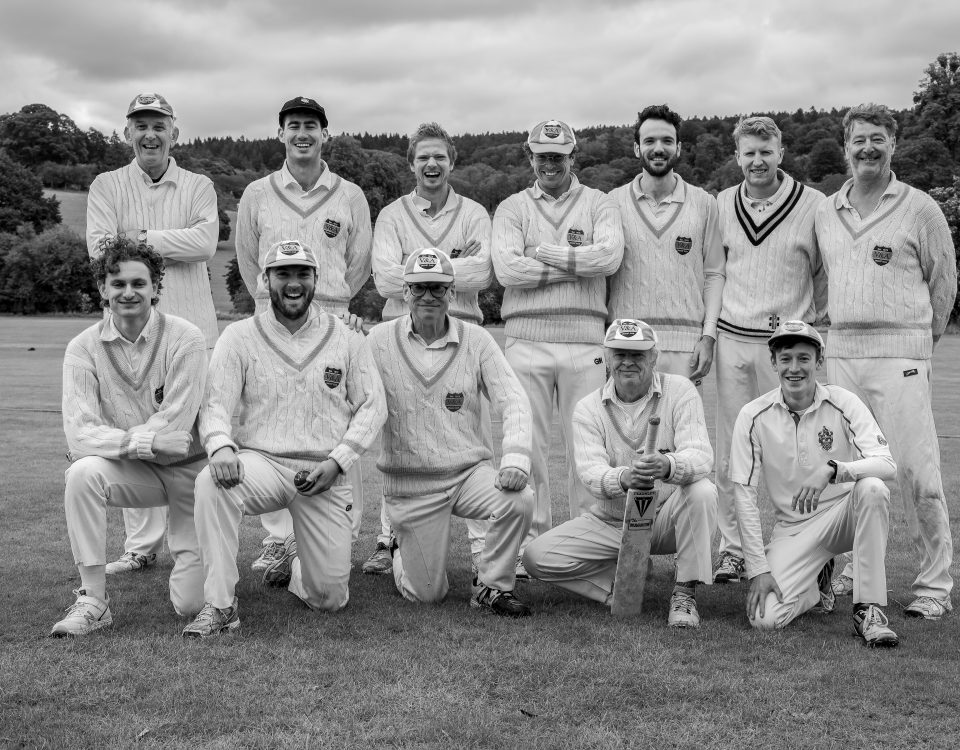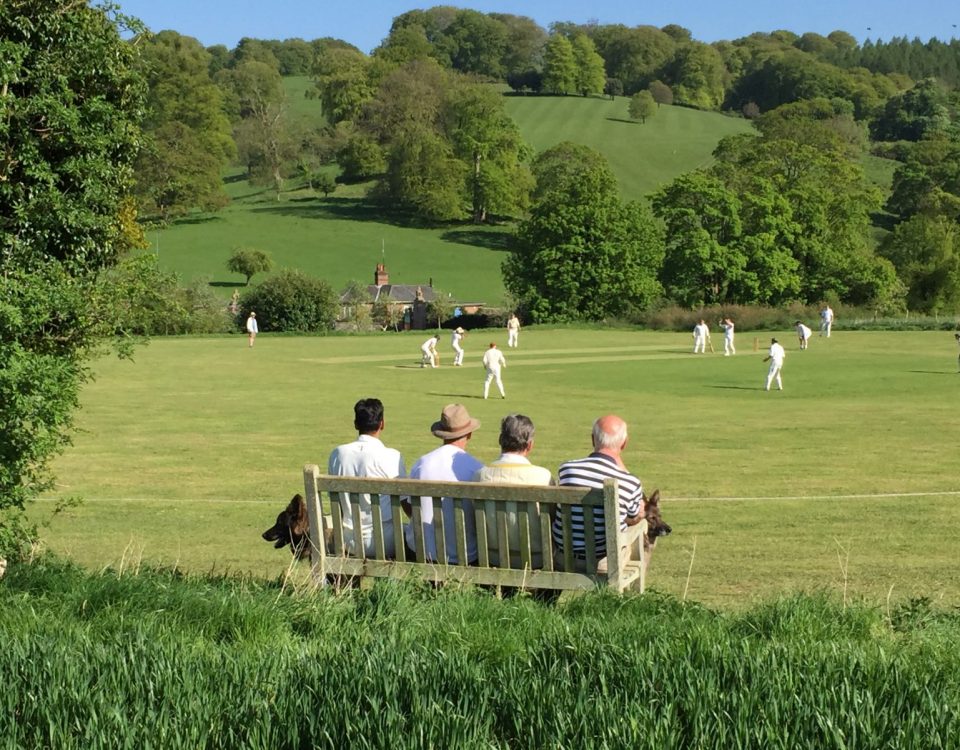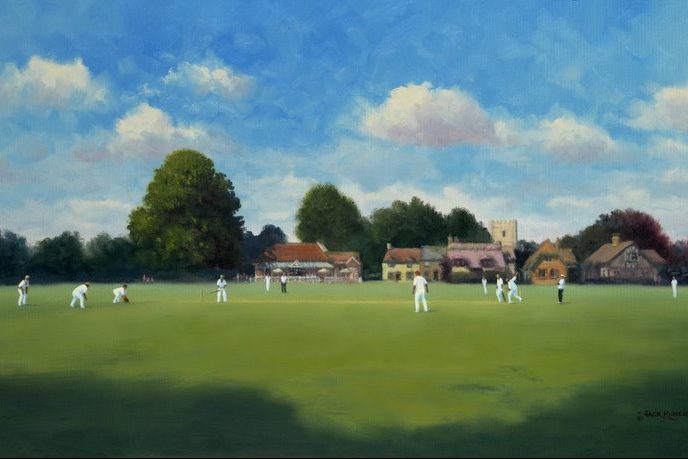V&A v. The Authors XI
This was the first fixture between V&A and the Authors XI, which is curious given the apparent synergy between the two clubs. The Authors own opening batsman, the lugubrious Anthony McGowan, describes his team as “crammed to the gills with the quite ludicrously posh… the full rage of characters from a 1950s public school story – the hearty, sporty type; the etiolated intellectual; the endearingly modest earl; even an exiled Ruritanian princeling.” In comparison, the V&A are a team of backwater plebs with barely even an Hon between us, but boasts several members who would qualify as authors. Who can forget that best seller, Luggage Labels from the Golden Age of Shipping (V&A, 1985) by N. Bird, for instance? In fact, there has be a steady demand from wandering teams willing to play in the shadow of Lord Camoys’s magnificent deer park and it is only recently that a gap in the fixture list has arisen.
The Authors XI where founded in the early part of the century as an expansion of J.M.Barrie’s private team, the Allahakbarries, so named under the misapprehension it was Arabic for Heaven help us. Barrie was a keen cricketer, but one of little talent. It is said if he did not like a ball he had just bowled, he would run after it, gather it up and bowl it again. The Authors team fielded Arthur Conan Doyle (who once dismissed W.G.Grace) and P.G.Wodehouse amongst others but was disbanded shortly before the First World War. It lay dormant for 100 years before being revived by a bunch of bright young literary things in 2012.
Despite a call for a prompt 11.30 start, V&A captain Ross Ashcroft was nowhere to be seen at the appointed hour. The toss was taken in his absence and, out of collective idleness rather than for any tactical reason, we chose to bat. Tight bowling from the Authors, Charlie Campbell in particular, saw the V&A make a turgid start. Rob Noble eventually threw caution to the winds and struck two lofted fours before being bowled attempting a third. Nick Pritchard-Gordon was fortunate to survive a close lbw shout, where the bowler obscured the umpire’s view, but was run out shortly afterwards by a direct hit from Fiennes. With Langley having been caught at cover point earlier, the V&A where reeling at 34 for three in the fourteenth over.
The mood in the dressing room was further dampened by the presence of the Stonor Craft Fair spoiling our view and the racket caused by one man and a guitar belting out covers of everything he could sing and a good few he could not. It was suggested that he might be made to stop on Heath and Safety grounds, given that his continued presence at the microphone would surely result in homicide.
A minor V&A recovery followed in the form of the watchful Bowden and elegant Ashcroft, increasing the scoring rate against some lesser bowling, but four more quick wickets saw us in danger of subsiding before the end of our overs. Blushes where spared by a run-a-ball fifty partnership either side of lunch between Tom Bird and Christiaan Jonkers, which mixed classical (rarely) with the bucolic (mainly). A brief cameo from Louis Jacot saw the V&A to 156-8 at the end of their allotted 35 overs; below par certainly, but defendable.
An account of the day would not be complete without touching upon lunch. Even by the standards of the epicurean year, the spread was exceptional. Whether by accident or design the combined efforts of Megan, Jessica, Annette, Nicky and Nick P-G amounted to a three course lunch: presse of confit duck and orange to start, a choice of penne al forno or roast beef to follow and strawberries for pudding. Conversation around the table was, as usual, rich and various. Nick Emley’s outlined his all time West Indian XI, confused somewhat by thinking George Headley was an opening batsman (he never once opened for the West Indies). Elsewhere a discussion raged on how one should pronounce Chateau Talbot, a French wine but named after and Englishman (John Talbot, Earl of Shrewsbury). Meanwhile, Nicky Bird opined that Job, whilst having been through a great deal, might not have made the most entertaining dinner guest.
The Authors also started their innings steadily with Fiennes looking as elegant and correct a batsman as I have seen at Stonor since Robbie Lawson left for Australia. McGowan and Owen were bowled by good balls from Jonkers and Jacot respectively and Tom Holland, who has received batting coaching from Alistair Cook, missed his first ball which was unsportingly straight. He was replaced by Joe Craig, who reputedly once hit a century from twenty-six balls and had clubbed his way to 37 at about that rate of knots when he holed out to Jacot at long on off the wily bowling of Bowden. The match was delicately poised at tea, the Author’s requiring just 64 from twelve overs but with the top half of their batting gone. Hogg and Falk appeared more than up to the task and where moving serenely towards their target when Louis Jacot took another good catch at long on to dismiss Hogg. In the next over Falk skied one to the wicketkeeper and there was just a slight whiff of panic among the Authors’ ranks. But like the V&A, the Authors bat all the way down and with nine balls remaining, the final runs were scored leaving the Authors XI worthy victors by three wickets.
So to The Crown, for tales of Authors’ match against the Vatican, a team stuffed with young priests not averse to the odd bit of sledging. Also of William Fiennes’s father, Nathaniel, Baron Saye and Sele, who had watched some of the game. He had saved the life of Nicky Bird’s father at Arnhem in 1944, without which the V&A Cricket Club could never have existed in its current form.
Christiaan
Nicky Bird wrote:
Thanks to Jessica, Megan, Annette, Bird N and Nick P-G for co-operative catering, the sign of things to come.
The Authors XI really are authors. Their best bowler was Tom Holland, the historian of the Roman world, and William Fiennes (The Snow Geese) was their best batsman. They boast novelists, poets and a blogger. One or two of us might qualify, certainly Adam and Bird N. for his definitive Luggage Labels from the Golden Age of Shipping (V&A, 1984).
They played the Pope earlier this year, or rather the Vatican team. A team stuffed with young priests not averse to the occasional swear word. The father of William Fiennes (Lord Saye and Sele), who watched the game, was responsible for N. Bird being at Stonor. He saved the life of Tom Bird Snr at Arnhem.






